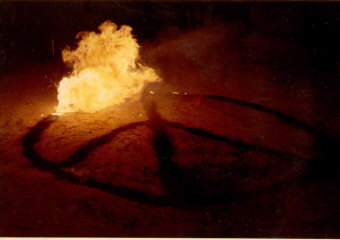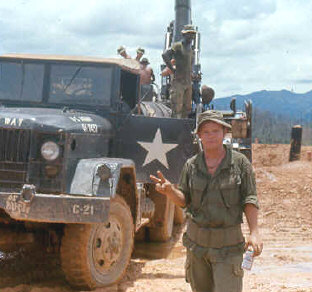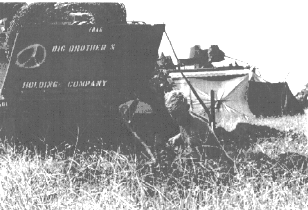And it's one, two, three,
what are we fightin' for?
"I-Feel-Like-I'm-Fixin'-To-Die
Rag"
Country Joe McDonald
PEACE

Peace
symbol from extra powder
Central Highlands -- Kontum
6/14th Arty, 1st Field Forces
Photo: Dennis Proulx
early 1970
INDEX
Background sound track -
"Radio First Termer" -
The Dave Rabbit radio show was an underground
"outlaw" radio show in Vietnam during the war

GI flashing peace sign
FSB Veghel,
Vietnam
Photo: Don Aird
No study of the Vietnam War would be complete without a long, serious look at the anti-war movement. The Vietnam War became very controversial in the late 1960's and early 70's.
|
FROM
LATER NEWS REPORTS... |
Some historians
point to the TET Offensive in early 1968 as the major turning point for increased anti-war
sentiment in the US, even though Viet Cong forces were severely decimated in their
countrywide attacks.

Late in the war, even Vietnam Veterans began to sponsor anti-war rallies in Washington, DC. During one such rally, veterans threw their medals away to indicate their disgust with the ongoing war.
|
FROM
LATER NEWS REPORTS.. |
'Peace signs' began
to appear more frequently in Vietnam after 1968. The "V" hand signal,
which meant "Victory" during World War 2, became as common as the traditional
"upside down Y" peace sign.

Depending on a person's opinion of the Vietnam War, you were considered either a "hawk" (pro-war) or a "dove" (anti-war). These sorts of divisions even occurred within families, symbolizing the great emotional turmoil which was created by the United States longest war, half-a-world away in Southeast Asia.

"War
is a crime. Ask the infantry and the dead."
Hemingway
There is
discussion about "just" wars...
whether or not a particular war is just.
Members of
certain religions are forbidden to participate
in a war if it is considered to
be unjust.
Most scholars point to
the 5th Century and St. Augustine of Hippo
as the formulator of the 7-point "Just War Doctrine"
THE JUST WAR DOCTRINE
-
War must be the last resort and used only after all other means have failed.
-
War must be declared to redress rights actually violated or for defense against unjust demands backed by the threat of force.
-
The war must be openly and legally declared by a legal government.
-
There must be a reasonable chance of winning.
-
The means used must be in proportion to the ends sought.
-
Soldiers must distinguish between armies and civilians and not kill civilians on purpose.
-
The winner must not require the utter humiliation of the loser.
MORE
ON THIS TOPIC:
The Ethics of
War
Primer on the Just War Doctrine
|
CO |
Conscientious
Objection and Alternative Service
(Source: Selective Service System - May 30, 2002 revision)
A
conscientious objector is one who is opposed to
serving in the armed forces and / or bearing
arms on the grounds of moral or religious
principles.
HOW TO
APPLY
In general, once a man gets a notice that he has been found qualified for
military service, he has the opportunity to make a claim for classification as a
conscientious objector (CO). A registrant making a claim for Conscientious
Objection is required to appear before his local board to explain his beliefs.
He may provide written documentation or include personal appearances by people he knows who can attest to his claims. His written statement might explain:
-
how he arrived at his beliefs; and
-
the influence his beliefs have had on how he lives his life.
The local board will decide whether to grant or deny a CO classification based on the evidence a registrant has presented.
A man may appeal a Local Board's decision to a Selective Service District Appeal Board. If the Appeal Board also denies his claim, but the vote is not unanimous, he may further appeal the decision to the National Appeal Board.
WHO
QUALIFIES?
Beliefs which qualify a registrant for CO status may be religious in nature,
but don't have to be. Beliefs may be moral or ethical; however, a man's reasons
for not wanting to participate in a war must not be based on politics,
expediency, or self-interest. In general, the man's lifestyle prior to making
his claim must reflect his current claims.
SERVICE
AS A CONSCIENTIOUS OBJECTOR
Two types of service are available to conscientious objectors, and the type
assigned is determined by the individual's specific beliefs. The person who is
opposed to any form of military service will be assigned to Alternative Service
- described below. The person whose beliefs allow him to serve in the military
but in a noncombatant capacity will serve in the Armed Forces but will not be
assigned training or duties that include using weapons.
ALTERNATIVE
SERVICE
Conscientious Objectors opposed to serving in the military will be placed in
the Selective Service Alternative Service Program. This program attempts to
match COs with local employers. Many types of jobs are available, however the
job must be deemed to make a meaningful contribution to the maintenance of the
national health, safety, and interest. Examples of Alternative Service are jobs
in:
-
conservation
-
caring for the very young or very old
-
education
-
health care
Length of service in the program will equal the amount of time a man would have served in the military, usually 24 months.
(Source: Selective Service
System - May 30, 2002 revision)
"To
delight in war is a merit in the soldier,
a dangerous quality in the captain, and
a positive crime in the statesman."
Santayana
Excerpt
from a memoir about the Vietnam War...
"When
Heaven and Earth Changed Places --
A Vietnamese Woman's Journey from War to Peace"
by Le Ly Hayslip with Jay Wurts
A long time ago, in a fight for justice -- a fight over strong beliefs about right and wrong -- a proud boy chopped off another boy's arm with his family's sword. The victorious boy, believing the battle was over, gave thanks, sheathed his weapon, and went home.
The boy lived with his grandmother, who taught him to always be good and honorable; and with an orphan girl, whom the grandmother had raised to be an honorable wife for her grandson.
Not long after the fight, a call to battle reached their house. The king's messenger told them a great war was beginning that would test the power of good against evil. Understandably, the boy had two minds about responding. He believed in goodness and virtue, of course, and had proved it in his fight with the wrong-headed boy whom he had maimed. But he was soon to marry his fiancée, too, and was anxious to begin a family.
To resolve this dilemma, the boy consulted his wise old grandmother (who had taught him everything about the past), and his fiancée (who shared his dreams about the future), and asked them what to do. Because the grandmother loved virtue and justice about all things, she said the boy should go to war without hesitation. Because the girl loved the boy and also respected the grandmother's opinions, she too said the boy should go and promised to wait faithfully for him no matter how long the war should last.
So the boy went with the messenger and was gone a long time, during which he distinguished himself in many battles. When he returned, however, he found his home in shambles. The crops had failed, the animals had run away, and the house itself lay in disrepair. When he opened the door, he was greeted by his fiancée, who now looked as old as the grandmother he remembered.
"What happened?" he asked in astonishment. "Why has my home been ruined? Where is my grandmother? What's happened to you?"
"It was horrible," the fiancée said, falling weeping in his arms. "After you left, the boy whose arm you cut off came back and took revenge against us. He killed your grandmother and chopped her into pieces, then he raped me, pillaged our house, and burned our farm."
The boy-turned-soldier already had his ancestral sword half drawn in rage when he cried, "I will avenge this atrocity! Justice and virtue must prevail!"
On his way down the road, he stopped at his grandmother's grave and prayed for the strength and courage he would need to avenge her. While he was praying, his old enemy appeared. But instead of striking him from behind or calling him to combat, the enemy fell to his knees and begged the soldier to behead him for the wrong he had committed.
The soldier, believing his prayer for justice had been answered, drew his sword and prepared to strike, when a bell sounded in a nearby temple. The soldier paused as a song, born on the wind in a chorus of ghostly voices -- now his grandmother's, now the victims he and his ancestors had killed in war, now the voices of his own children yet-to-be-born -- filled the air around him:
Late afternoon--
Hear the bell--
The bell wakes up
My soul--
We must hurry to
become
Enlightened--
We must kneel beneath the tree of
Buddha--
We must look into the face of god and
Forget the past--
To forgive our
brother is to forgive
Ourselves--
We abandon our revenge;
Our lives have seen suffering enough.
We are tired and worn out with
Ourselves--
If I take revenge,
it will be the cause;
The effect will follow me into my next life.
Look into the mirror: see the compassion in your heart.
Mankind--
The soldier, having had his passion interrupted by the bell and his spirit awakened by the song, put away his sword and helped his enemy get up.
"Go your own way," the soldier said. "I took your arm, and that cannot be replaced; but I could have had your life, and this I have returned to you."
"Go your way in peace," the one-armed man replied. "I took your loved ones, it's true, and what's done cannot be undone; but I, too, have returned to you your life: for my brothers would have avenged me even though you had my head."
So the two men, no longer boys, parted and began new lives. To commemorate the breaking of the circle of vengeance, the temple bell now rings twice each day and reminds people to arrest their passions long enough to think; and having thought, to hear the song of enlightenment.
Veterans Against the Iraq War (VAIW)
Central Committee for Conscientious Objectors
American Friends Service Committee
Vietnam Veterans Against the War
VIETNAM - An Antiwar Comic Book
Federation of American Scientists
United Nations Office at Geneva
The Antiwar Movement We Are Supposed to Forget
Martin Luther King, Jr. Papers Project at Stanford
History of Conscientious Objection
